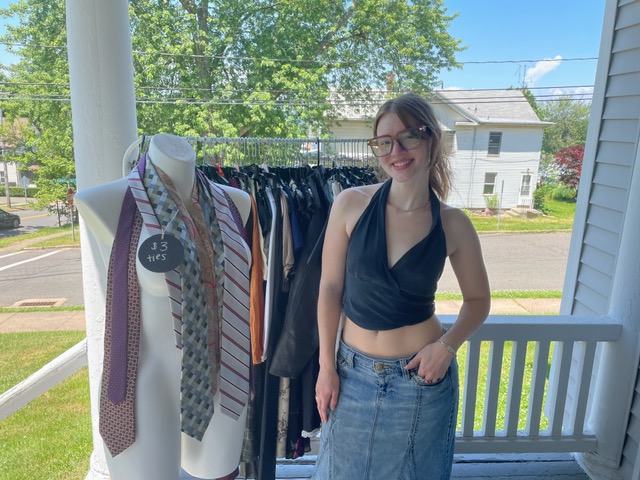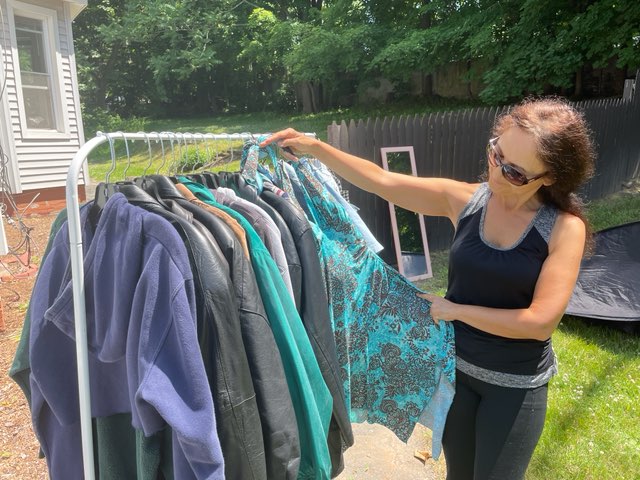Madeline Kizer of Wallingford hosts clothing swaps to promote second-hand shopping, aiming to raise awareness of fast fashion’s impact on the environment.
A documentary on the fashion industry sparked Kizer’s interest to learn more about fast fashion. So, she decided to do her own research.
Fast fashion is based on a low-cost, high-volume business model that has come under fire in recent years for its impact on the environment and workers in the supply chain, Quartz Magazine reports. The mass production of clothing contributes water pollution and emits large quantities of greenhouse gases, and according to a Vogue Magazine report “20% of global water waste is caused by the fashion industry.”

Colleen Lucey Photo.
Inspired by the success of clothing swaps in the United Kingdom, Madeline Kizer decided to launch her own business.
According to a study by the Ellen MacArthur Foundation, “The textiles system
operates in an almost completely linear way: large amounts of non-renewable
resources are extracted to produce clothes that are often used for only a
short time, after which the materials are mostly sent to landfill or incinerated,” under-utilizing recycling. And, many of the industry workers are women, age 18-24, who are exploited working long hours, making low wages, reports re/make.
Kizer, 20, was introduced to buying second-hand clothing at an early age. Like other teenagers, she found herself buying fashion online.
As she learned more about the fashion industry, she stopped shopping at retail stores during her senior year of high school.
“You can make so much change, just by shopping second-hand. I have so much fun doing it,” she said of her decision. “Once I started learning more about the fashion industry and its impact on the environment and people, I just didn’t want to support it anymore.”
Young Entrepreneur
After graduating high school, Kizer was accepted to the University of Connecticut as a marketing major. The following summer, she participated in UConn’s entrepreneurial program for female students. During the program, each member had to identify a problem in society and solve the issue with a business.
At the time, she was an intern for Raine Magazine, a fashion publication, and did research on clothing swaps in the United Kingdom. Inspired by the success of their clothing swaps, she wanted to replicate them.
In July 2021, she used HUBCAP, a nonprofit rental facility in Wallingford, for her first clothing swap. People from the community brought in five to ten gently used items. They were first examined for any stains or rips. The approved clothes were displayed around the room.
A customer can then pick up as many items of clothing they were approved for. There is no money exchange at the clothing swaps, besides a small admission fee. Kizer donated proceeds to charities that support eco-friendliness such as Planet Aid and Remake.

Colleen Lucey Photo.
Zorayda Cocchi of Wallingford said that clothing swaps “give a sense of community.”
Kizer continued clothing swap events for the UConn community. She held multiple outdoor swapping events on-campus to promote second-hand shopping for college students. She believes that the 18 to 24-year-old demographic are the main consumers for fast fashion.
“That’s why I think fast fashion is so popular because it gives everyone the opportunity to purchase really cheap items. To fit in to that desired or wanted look. I hope that in the future there will be more of a sense of identity with clothing. Trends are always going to be here, I don’t see those really disappearing in any way,” said Kizer on teenagers’ need to buy trendy clothing.
Kizer has learned to upcycle, which is to sew or alter a piece of clothing for a one-of-a-kind look. After adding or removing fabric, she resells the new item to customers through her Instagram account, Kizer Kollection.
Along with upcycling and clothing swaps, she also hosts tag sales featuring clothes, shoes and jewelry. Her most recent event was a three-day tag sale with clothes from petite to plus size. Customers stopped by brose items and could try on clothes in her portable changing station.
Zorayda Cocchi of Wallingford was one of those customers. She expressed her love for clothing swaps and buying second-hand.
“The clothing swaps give a sense of community,” Cocchi said. “It’s a sense of social engagement, it’s a sense of community. It’s good for the environment. It has so many benefits.”
Cocchi wishes that all women would go to clothing swaps instead of shopping from fast fashion brands. She became familiar with clothing swaps from local fundraising events in the community.
For the rest of the summer, Kizer and two classmates are finalizing UConn Swap Shop, an on-campus thrift store. Students will have the opportunity to swap clothing, each item having a designated point value. Kizer recalled being a freshman without a car on-campus and wanting to thrift in her free time. She hopes that the thrift store will teach students the importance of shopping second-hand.
Kizer’s account on Instagram can be found @KizerKollection or online at https://kizerskollection.com/
 Colleen Lucey, a junior at the University of Connecticut, writes about the most pressing health, wellness and safety issues affecting people ages 18-40. To reach her, email colleenlucey15@gmail.com.
Colleen Lucey, a junior at the University of Connecticut, writes about the most pressing health, wellness and safety issues affecting people ages 18-40. To reach her, email colleenlucey15@gmail.com.